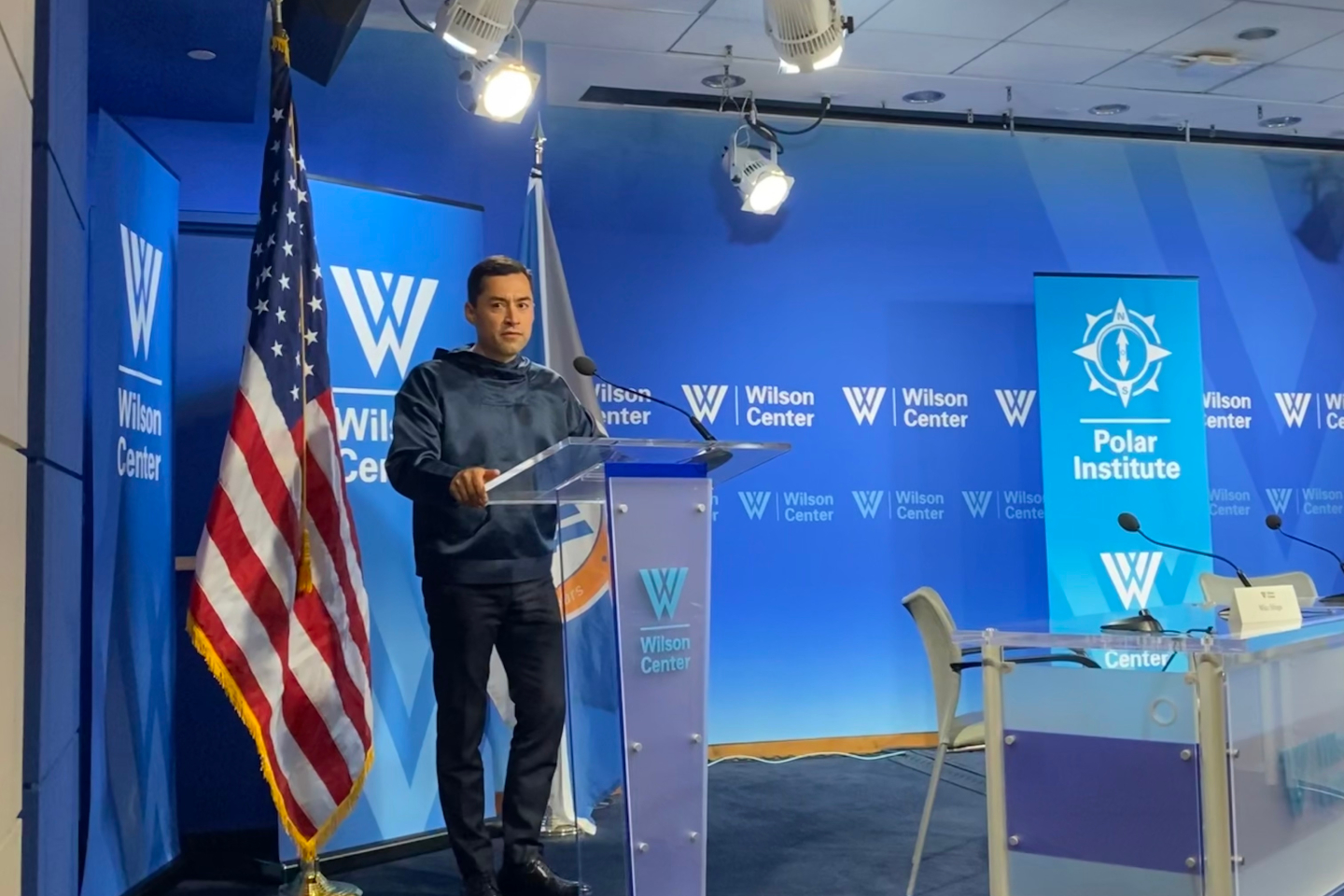Greenland PM calls for closer US ties in Washington visit
After backing costly sanctions against Russia, Greenland is courting international investments in sectors such as mining and tourism.

Greenland Prime Minister Múte B. Egede on Wednesday pushed for stronger political and economic ties between his country and the United States in his first visit to Washington, D.C., while in office.
“The United States is Greenland’s most important strategic partner,” Egede said at an event hosted by the Wilson Center’s Polar Institute. “We should work hard to be mutually preferred partners in the Arctic.”
Kenneth Høegh, head of Greenland representation in D.C., expressed a similar stance while speaking at the event.
“We believe that this is the time for us to turn our eyes towards the West,” he said.
Egede, who heads the left-leaning Inuit Ataqatigiit party (IA) party, became prime minister in the spring of 2021 after an election in which a controversial uranium and rare earths mine played a key role. (Greenland is a self-governing country within the Kingdom of Denmark; Copenhagen retains control over some elements of government, including foreign relations and security.)
Despite riding to victory on opposition to that mine, Egede took pains Wednesday to emphasize that Greenland continues to welcome interest in other mining projects.
“While my government has banned uranium mining, we welcome all other projects which are in line with the environmental standards set out by the government of Greenland,” Egede said.
Mining will be an important part of Greenland’s economy and society, he said, with “several major projects in the pipeline.”
Greenland also aims to enter a formal trade and investment agreement with the United States, Egede said.
“Trade between Greenland and North America is one of our central priorities,” he said.
While Greenland has courted investment from the U.S. and Canada more intensely for several years, recent events have added some urgency.
Although it is outside the European Union, the country followed the bloc’s lead in imposing sanctions on Russia, following its invasion of Ukraine. The move affected about 15 percent of the country’s total exports, according to Egede.
“We’re trying to find new markets, so the negative effects can be as small as it can be,” he told ArcticToday in an interview on Wednesday.
“But we also need to open markets, like U.S. and Canada, and have more exports to like-minded countries like us” — democratic countries that already have good partnerships with Greenland, he said. “That’s why we need to have a more diversified market, so we can keep our economic growth.”
Fisheries exports have increased to the U.S. in the past year, for example, he said.
Despite the blow to its economy from exiting the Russian market, Egede said that move was important to show its support for a rules-based international order and to align more closely with Greenland’s partners and friends.
“We are a part of the international community, and we are one of your allies, in the western part of the world,” Egede said.
Greenland has had a long path to independence, Egede said, and he pushed back against Russia’s violation of Ukraine’s borders and sovereignty. “Of course, we need to be part of the rest of the world to fight against this aggression.”
The war in Ukraine highlighted the importance of strengthening partnerships with the U.S., he said. “I hope our visit today can be a stepping stone for a new era.”
And indeed, his visit to Washington came a day after he — along with Canadian Minister of Foreign Affairs Mélanie Joly and Danish Minister of Foreign Affairs — signed a landmark deal in Ottawa settling a 50-year-old border dispute and creating a new land border between Greenland and Canada on Hans Island, or Tartupaluk.
“With diplomacy, with respect for international laws, and of course with dialogue, you can always make some solutions without war,” Egede said.
Greenland’s efforts to have yielded some dividends. In 2019 the U.S. announced it would fund a large-scale mineral survey and in 2020 opened a consulate in the capital Nuuk. It also announced a pair of aid packages in 2020 and 2021.
Greenland is upgrading its airports to open up to direct flights from North America in order to increase sustainable tourism and trade.
The country is also courting investments in hydroelectric power and other sources of clean energy, with the eventual goal of becoming an energy exporter.
“Greenland could become an exporter of renewable energy within the coming decades,” Egede said. “We also can see the big oil companies are not interested in the Arctic in the last 10 to 15 years. So why not think about the next one?”
A majority of Greenlanders would like to become fully independent from Denmark. “This is what people want in the future,” Egede told ArcticToday. “I will not say a date and when it will happen, but we are always looking and working to be more self-sufficient.”
Increased economic ties would the U.S. would help in those goals, he said. “It can open new doors and new possibilities, and more economic and social growth.”
Egede reiterated that his government wants more public and private-sector investments from the U.S. and others, in mining, tourism, energy, and other sectors.
“Our closest friends have not been invested as we wish, in the last year,” he said. “So now we’re changing our strategy to come to our friends, make some new partnerships, and take the next step to the new Arctic.”